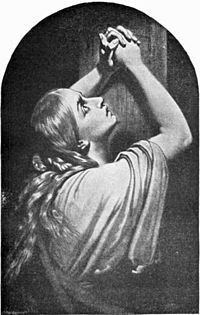After lingering with Charles Finney's memoirs for the past week, it finally struck me that Finney's use of altar calls contrasts markedly from his own, personal process of conversion. It's not until you read his memoirs that you realize that his public ministry of evangelism is quite different from his private experience of conversion. But after reading through his whole book, I think I understand how the altar call connects to his own life experience.
 Image via Wikipedia
Image via Wikipedia
Finney mentions summoning attenders to make a public commitment early in his preaching ministry. But it is not until he talked about "the anxious seat" well into his memoirs that I understood what the alter call was intended to accomplish.
The very beginning of his memoirs is devoted to how he found his own commitment to Jesus. In particular, as Finney wrestled with his own salvation he found himself unable to pray. He could not find the ability to give himself over to God. He went in and out of his house, talked with others, and went walking the streets, roaming and anxious, and still found that he could not find contentment for his own soul.
He eventually looked over to the woods, a quiet stretch of land up a hill and away from other people. It was there that he went in private -- apart from the company of others.
There in the woods, Finney finally prayed out his confession and commitment, releasing himself, discovering a sweetness reconciling to God in prayer, and finding joy and rest for himself. When he committed to Christ, he committed to preaching the gospel of Christ.
As Finney began to preach, he was struck by the response to the messages. He tells story after story throughout his memoirs of people who agonized over their salvation and were overcome with anxiety over their spiritual state. Attenders moaned during church services. People regularly fell out of their pews and onto the floor. Both men and women fainted in the fellowship.
The consternation and disturbance hits all social classes and all professions both in America and in England. Beyond church services, Finney regularly made house visits (often late at night and often at great inconvenience) to counsel and pray over individuals moved near the point of insanity over their spiritual destiny.
I think Finney empathized with these struggles. He recalled his own turmoil before committing to Christ.
As a pastor, he wanted to save people from such pain.
 Image by Martino's doodles via Flickr
Image by Martino's doodles via Flickr
See, Finney was convinced that an individual who clearly understands the gospel and their responsibility to respond to it will experience emotional distress. From his experience and observation, the gospel provokes an emotional agitation, a deep disturbance that persists until the person makes a personal and proper response to God.
It is therefore out of a pastoral concern for the crisis experienced by near-converts that Finney crystallized his notion of "the anxious seat." Individuals who understand the gospel begin to occupy the anxious seat; they experience a type of physical agony that mere rest will not take away. The seat becomes a place of torture -- the unmoving agent stuck sitting amidst the stirring of their own conviction.
 Image by wheat_in_your_hair via Flickr
Image by wheat_in_your_hair via Flickr
For Finney, the altar call delivers people from their anxiety. It takes them out of a passive state to an active one. By inviting attenders to respond to the message, the preacher delivers convicted persons from their anxiety and toward spiritual ease in the elation of obtaining salvation through their active repentance. The preacher and volunteers steer each person out of their anxiety by giving them assurance of their salvation by pointing to their standing and coming forward as a physical mark of their commitment to Jesus.
In the end, while Finney's own conversion was private it emerged from a state of utter distress. Finney hoped to ease people from such emotional pain by directing them to a standardized response that moves them productively -- even efficiently -- toward salvation and emotional comfort.
Yes, altar calls are efficient means toward salvation, allowing more converts to find their way into Christian fellowship than if they pursued it without direction privately. But for Finney the use of alter calls emerges not for the sake of efficiency alone, but rather a pastoral concern to deliver people from spiritual agony toward spiritual elation. In this sense, finding salvation is simultaneously a means to find healing.



No comments:
Post a Comment